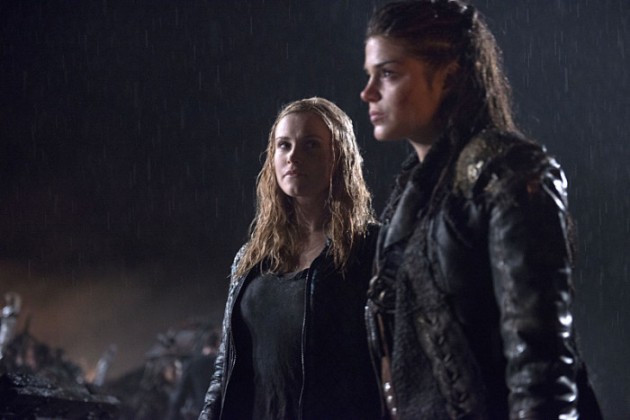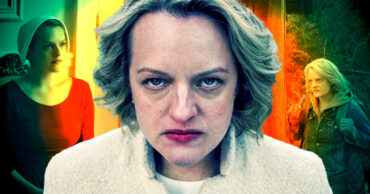
The CW’s The 100 is one of my favorite shows on television for a bevy of reasons, from its plethora of strong, compelling female characters to its talented cast (led by the fantastic Eliza Taylor) to its always intense action sequences. However, what makes the series not just one of my favorite shows, but one of the best shows currently airing on TV right now, is that it’s a smart, rich, and complex series, one that doesn’t feel the need to hold its audience’s hand through every difficult character decision; The 100 understands that morality, especially in the face of extreme circumstances, is not as simple as black or white. As perfectly illustrated in many moments in last night’s terrific episode, “Resurrection, The 100 has grown into the most morally complex drama on network TV.
The reason why so many people, whether they be viewers, critics, award show voters, etc., typically put cable series on a pedestal high above network shows is because many network programs out there today are complacent and comfortable. Many of them understand that their characters can be one-note stereotypes and that their stories can rely on cliches, and that people will still tune in and watch week after week. That’s not the case with The 100, though, as it has continued to push its characters to their limits throughout all 26 episodes it has aired, challenging viewers to embrace characters that don’t always choose to do what is deemed the “right thing” or the “good thing.”
As I mentioned above, last night’s episode of The 100, “Resurrection,” showcased the series’ moral complexity in many of its scenes. However, two specific ones stood out from the rest.
First, let’s discuss the scene in which Jasper leads the rest of the 48 against Mt. Weather’s guards. Even for a show at 9 p.m., it’s an incredibly violent scene, one that shows our protagonists stabbing, shooting, and beating individuals mercilessly. And then, after one of the 48 is taken, a girl that Jasper promised he would protect, Jasper takes his ax and kills a wounded but still living guard as he lies moaning on the ground.

Jasper’s decision to kill the guard is not brought about by a sense of protection; it’s not a heroic act that saves a loved one. No, Jasper slamming down that ax is vengeance, a retaliation against the people who have begun to dissect, torture, and, ultimately, kill his friends. It’s a vicious action and, as the promo for the episode stated, it’s cold-blooded–there’s no second thoughts or any hesitation from Jasper–and The 100 is not afraid to paint its characters in that light. Jasper allows his fury and frustration to get a hold of him for that one moment, but we understand that it doesn’t define him–he’s still the kid who was so excited to be down on earth back in the show’s pilot, the same guy who awkwardly flirted with Maya and acts like a goofball with Monty.
We know that Jasper’s killing of the guard doesn’t define him just as we know that Clarke’s incredibly difficult choice to let many of her and Lexa’s people die from Mt. Weather’s missile strike doesn’t define her, something that Kane puts into perspective for Abby in the best scene from “Resurrection,” as the two of them, trapped beneath all the rubble, discuss how far they and their people have come and what they’ve done to get here. These kids, Clarke, Jasper, Bellamy, Octavia, and the rest of them, grew up on the Ark and were shown that ruthless decisions were necessary in order for survival.
From Abby allowing for her husband to be floated to Kane forcing over 300 parents to die in order to provide enough oxygen for the rest of the people on the Ark to Clarke’s murder of Finn so that the truce between the Sky People and Grounders could be reached, the lives of all of these characters have been filled with shades of grey, never black or white. However, their controversial decisions don’t reflect any type of darkness or evil inside of them but rather the basic instinctual need to survive, to continue living, no matter what it takes. At its core, that’s really what The 100 is: a story about survival, about finding a way to keep on going, even when it seems impossible.
And it’s that need to survive that both the Sky People and Grounders have that separate them from the Mountain Men. Cage and the rest his supporters at Mt. Weather don’t need to go out onto the ground for any immediate reasons; they simply see the ground as their birth right, their true home. Their actions of violence and cruelty are born out of desire, not any type of requirement, and it’s this distinction between what people need and what people want that is the only form of clear-cut morality to be found on The 100, letting us know that, as Abby told Clarke in last night’s episode before she went off to war, the Sky People and the Grounders who have united with them truly are “the good guys.”
[Photos via The CW]
 Follow Us
Follow Us






Just saying: “born out of pure anger” and “cold-blooded” are not the same. If the action is one, it can’t also be the other…! ;-)
Very true, Max, and a mistake on my part that has been fixed. Meant to just call it a vengeful act. Thanks for reading and commenting!
:-) Very nice article. I was skeptical of the show at first, but I have to say it has gotten better and better, and now I am very impressed with it. The science parts are not great, but the action never lets up and the characters are compelling and resolute in a way you don’t see on other shows. This is one of the few shows where the characters are more real to me than the actors who play them (which is a great achievement by the actors). Clarke, Bellamy, Octavia, Raven, etc. – the show makes you feel what it is like to make hard decisions under hard circumstances and having to live with it, which is rough. I’m 43 years old and hard to impress by now, but if I’d seen this show as a teen, it just might have blown my mind!
The 100 is a typical tv syfy soap opera with lots of emotion and no brains. Ratings are inversely proportional to the IQ of the watchers. Sells lots of pizza and hamburgers.
I stopped watching after about 8 episodes with the nonsense and illogical plots. Don’t bother this reviewer is juvenile at best.